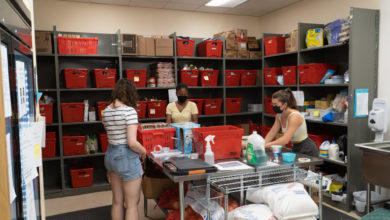For a sustainable future, we need to rethink Alberta’s economy
Information and communication technology could fill the gap that moving away from fossil fuels would leave.
 Markus Spiske
Markus SpiskeThis guest column is written through a partnership with the University of Alberta’s Sustainable Development Goals Alliance and The Gateway.
Climate activism has gained steam and wins worldwide over the past several decades. But it’s hard to say whether we have made real progress in Alberta. Throughout this period, the dominant message from activists has been a demand for complete divestment from fossil fuels. But climate activism has lacked a real plan to fill the hole that divesting from fossil fuels would leave behind in Alberta’s economy.
Ultimately, the threat of economic and social instability has held Alberta back from making real environmental progress. The information and communication technology (ICT) sector could fill that hole. Post-secondary institutions are critical in creating a transition plan to step away from fossil fuels and see real environmental progress. It’s not only an opportunity, but a responsibility for the University of Alberta to direct its resources towards holistic sustainability, not just climate action.
Fossil fuels are the single most significant industry in Alberta. The industry provides 18.4 per cent of Alberta’s Gross Domestic Product (GDP) and its royalties are the largest contributor to the provincial budget. This is only $2 billion dollars short of all personal and corporate taxes combined. Additionally, 125,000 Albertans depend on the fossil fuel industry for their income.
However, we will have to replace fossil fuels eventually. Why not replace it with ICT, which has incredible growth potential? ICT is the backbone of the digital economy — the share of the economy that relies on digital technologies — which is predicted to increase from 15 per cent of the world economy to 30 per cent by 2030. Internationally, a number of other countries are also engaging in the development of the ICT sector. In Organization for Economic Co-operation and Development (OECD) member countries, the ICT sector has grown three times faster than OECD’s total economy.
Renewable energies will have a difficult time filling the gap moving away from fossil fuels would leave. But ICT might be able to. Since 2019, the $5 billion invested in Alberta renewables has only created 5,000 jobs. At this pace, it’ll take decades and billions in investment for renewables to create enough jobs to replace the over 125,000 jobs the oil and gas sector accounts for. And even if renewables could create enough jobs, the difficulty and expense of transporting electricity means it likely wouldn’t be able to replace fossil fuels as an export. Whereas ICT is easily exported and has been consistently creating more jobs at a rate that’s three times the Canadian average.
Holistic sustainability-based perspectives recognize that there are multiple problems that must be addressed to create a sustainable future. Without economic prosperity, an environmentally sustainable future does not have the same significance, and vice versa. ICT can provide a brighter future for Alberta’s economy as we move away from fossil fuels. In doing so, it can facilitate the protection of our environment for generations to come.
There are excellent examples internationally which Alberta can use for its transition to a sustainable economy and environment. One unique example is Armenia. The country has faced struggles with its resource extraction sector, something Alberta may begin to face as we move towards net zero. As a result of its struggles, Armenia’s economy has relied on tourism, agriculture, retail trade, and manufacturing. A large part of Alberta’s economy also consists of these sectors, which Alberta will have to rely on even more as oil and gas production declines. But recently, its booming ICT sector has begun to change Armenia’s economy and its residents’ lives for the better.
ICT has changed Armenia greatly and digitalization — the process of replacing analogue systems with digital systems — continues to grow. ICT has grown into one of the largest sectors in Armenia with over 30,000 employees and thousands of firms. In 2018, it represented a growing seven per cent of the economy. Innovations from ICT and digitalization have created automated farms, high technology manufacturing, and more efficient and accessible social services in Armenia. Digitalization is likely to continue growing in its significance for the economy and society. Armenia’s success likely wouldn’t have been possible without its significant research presence, something which Alberta shares. And something that universities in Alberta could take the lead on.
Alberta’s similarities to Armenia show that Alberta has the necessary foundation to grow the ICT industry. It could be a viable way to transition away from fossil fuels without making economic and social sacrifices. The only thing missing is for groups with influence to amplify and project this perspective. The U of A has a lot of influence, not only in Alberta but globally as well. If the U of A refocuses its research, student group support, and advocacy to take a broader sustainability lens, it could lead the way towards a better future.




